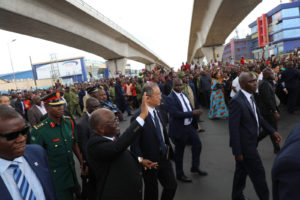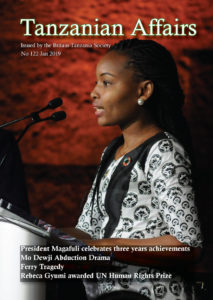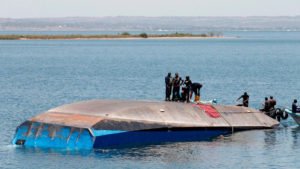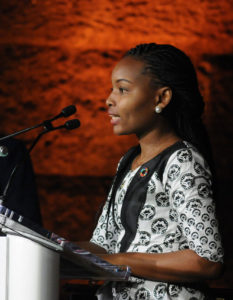by Ben Taylor

President Magufuli with Japanese Ambassador Masaharu Yoshida at the opening of the Mfugale flyover at TAZARA
President Magufuli celebrates three years of achievements
At a forum held at the University of Dar es Salaam in November, President Magufuli spoke of his administration’s achievements, citing expansion of industry, economic progress, removal of ghost workers from the government payroll and more.
The President, who was seated with the rest of the audience, won the praise of all the dons who took part in the discussion, including professors Humphrey Moshi, Hudson Nkotagu, Martha Qorro, Kitila Mkumbo and Rwekaza Mukandala.
President Magufuli detailed a number of achievements, including infrastructure development projects that are currently underway, and reviving Air Tanzania. He added that during the three years, Tanzania had managed to accumulate a total of $5.4 billion as the country’s foreign exchange reserves.
“This amount, which is enough to cover six months of Tanzania’s import requirements, has never been realised before. This has been possible due to prudent policies and controlling wasteful spending, including banning unnecessary foreign trips by government officials,” he said.
Contrary to some reports that Tanzania’s business climate was worsening, President Magufuli said that the country was the leading source of foreign direct investments (FDIs) among member states of the East African Community.
He restated his determination to implement the Stiegler’s Gorge Hydroelectric Power generation project in the hope that it would ensure that Tanzania had reliable and affordable electricity. He noted that a total of 32.5% of Tanzania’s land area is protected, trashing arguments that developing the 2,100MW Stiegler’s Gorge hydroelectric power generation project in the Selous Game Reserve would have some dire consequences on the environment and on tourism.
He argued that the project would reduce power costs, attract more investments and reduce prices of locally produced products, slamming some experts who produced an environmental impact assessment report to the effect that developing the project was bad for the environment.
On the topic of ghost workers, President Magufuli said previously TSh 237bn was being paid as salaries to ghost workers and TSh 189bn to workers with fake academic credentials on an annual basis. “Before the crackdown(s), the total civil service payroll was TSh 777bn per year, but we are now spending just TSh 251bn to pay salaries to our employees,” he said, adding: “There was a certain public official who was pocketing the salaries of 17 ghost workers every month… that is how Tanzania was.”
On industrial development, the President stated that a total of “3,066 new industries” have been established across the country in three years that he has been in power. He said this means new employment opportunities for thousands of Tanzanians in the country. He added that his government has already issued instructions to investors who have failed to develop industries they acquired some years ago to surrender them to the government.
He also remarked that “Tanzania will no longer supply raw materials abroad; we cannot continue with that business, instead we are going to produce and export ready-made goods to them.”
Finally, he recounted how the government has tightened control on unnecessary expenditures such as foreign travel by public officials, which has increased the amount of foreign reserves with the Bank of Tanzania. “Some officials were just spending public funds on flights, people were travelling abroad unnecessarily, some were conducting meetings in Dubai instead of using their offices’ boardrooms,” explained President Magufuli.
The former UDSM vice chancellor Prof Rwekaza Mukandala compared Dr Magufuli and Mwalimu Julius Nyerere in various aspects. He said Magufuli has a similar zero-tolerance approach to the late Nyerere on issues of corruption, unemployment, aid dependency, and laziness. “His fate will be known after the 2020 General Election,” he said.
Opposition parties complain of tightening restrictions
The year 2018 has been a challenging one for opposition parties. First, they have suffered multiple defections to the ruling CCM – including ten MPs (7 from Chadema, 3 from CUF), almost all of whom were re-elected in by-elections to represent the same constituencies for CCM, and over 200 local councillors.
CCM attributed sweeping victories in the by-elections to the party’s acceptance by the public. In contrast, the opposition, particularly Chadema and ACT Wazalendo, called foul play and pointed to multiple irregularities, claiming that CCM had used state organs to rig elections. The two opposition parties ended up boycotting participation in by-elections while pressing for major reforms to contain irregularities recorded during the previous polls.
Second, opposition leaders have been very busy battling cases in various courts. Leaders involved in criminal cases include Chadema chairman, Freeman Mbowe; secretary general Vincent Mashinji; deputy secretary general (Mainland), John Mnyika; deputy secretary general (Zanzibar), Salumu Mwalimu; Iringa MP, Peter Msigwa; Tarime Urban MP, Esther Matiko; Tarime Rural MP, John Heche; and the women’s wing chair and Kawe MP, Halima Mdee. This group face charges of incitement, alleged to have been committed in Dar es Salaam in February, on the same occasion when the police are alleged to have inadvertently caused the death of a student, Akwilina Akwiline (see TA120). The case forced Mr Mbowe and Ms Matiko to spend Christmas and New Year in remand prison after a court decided they had violated their bail conditions.
In a separate case in November, ACT Wazalendo party leader Zitto Kabwe was arrested and held for three days before being brought to court following remarks he made regarding clashes between citizens and police in Kigoma Region. Mr Kabwe was charged with three counts of incitement including intent to sow hatred among citizens and police through words he uttered during a press conference. He is accused of saying he had received reports from Mpete village, Uvinza district that over 100 people of Wanyantuzu ethnic group had been shot dead in clashes with security forces, though the police were yet to release information about the reported clashes.
A further series of cases saw the Mbeya Urban MP Joseph Mbilinyi, widely known as “Sugu” and the party’s secretary in the Southern Highlands, Emmanuel Masonga, being convicted for five months jail term after being found guilty of using abusive language against President Magufuli. They were released on May 10 this year after spending 73 days at Ruanda Prison.
Third, late in the year, long-mooted plans to amend the Political Parties Act of 1992 reached parliament, where a Bill of amendments to the Act was tabled. This follows several new laws and regulations introduced in the past few years that similarly tighten controls on the media, social media and bloggers, and the use of statistics.
If passed, the Bill will give the Registrar of Political Parties powers that go well beyond the original purpose of his office – to administer the registration of political parties – turning the “Registrar” into something closer to a “Regulator”. Specifically, this includes extensive powers to demand information – membership lists, details of party finances, and “any information as may be required.” Further, it includes the power to intervene in internal party management matters, such as administration of membership lists, restrictions on parties’ constitutions, and internal party disciplinary matters.
The bill also includes a new prohibition on parties acting as “a group that influences public opinion or government action,” restrictions on the formation of coalitions between parties, regulation of civic education and capacity building within parties, and a prohibition on parties forming any “militia, paramilitary or security group of any kind.”
The opposition and human rights defenders think the amendments are intended to kill the opposition and turn the country into a single party state, something that was strongly refuted by government authorities.
2019 year of action – the “Zanzibar Declaration”
In response to these and other challenges, a group of six opposition parties have said they will dedicate 2019 to mobilising the public to demand more democratic space.
Representatives of six leading opposition parties — including Chadema, Civic United Front (CUF) and ACT Wazalendo — met in Zanzibar a week before Christmas and resolved to have a campaign of public action.
The declaration states that: “time has come to renew our commitment and strengthen our solidarity in pursuing a national agenda against rising authoritarianism, an agenda that goes beyond individual interests of our parties. This will require courage to withstand the onslaught that we will face from the regime, firmness in our solidarity when attempts will be made to break it, and commitment towards inviting and incorporating other potential allies as equals in this movement.”
“We pronounce that 2019 is a year of reclaiming our democracy and taking back our powers and rights as enshrined within the Constitution of the United Republic of Tanzania, the Constitution of Zanzibar and other enabling pieces of legislation. We will hold public rallies in any and all corners of the United Republic of Tanzania. We will not allow an unconstitutional and unlawful order to restrict us to our individual constituencies. If the government is threatened by us exercising our constitutional rights, we dare them to take us to court.”
“We declare that we will unanimously embrace all citizens and all social and economic groups in the country willing to conquer their fears and join the grand coalition that we envisage to defend our democracy. We vow that we will no longer be silenced or intimidated; we will no longer succumb to the state sanctioned violence against our individual and collective rights and entitlements. We commit ourselves to taking this message of freedom to all our fellow leaders, constituents, and allies and support them in taking action, whether small or large, as a symbol of solidarity.”
In response, the deputy Minister of Home Affairs Hamad Yusuph Masauni immediately warned the opposition that they will face stern action from the state if they dared to go through with their plans.
Meanwhile, in Belgium, recuperating Singida East MP (Chadema) Tundu Lissu said that he was homesick as he marked one year since surviving an “assassination” attempt in Dodoma. Mr Lissu, was sprayed with 32 bullets out which 16 hit him when returning home after a parliamentary session. He was rushed to the Dodoma Referral Hospital, then to Nairobi in Kenya and finally to Belgium where he has made good progress. Speculation has grown that Lissu may be given the opportunity to contest for the presidency in 2020 on the Chadema ticket.
Nutty politics
The row over trade in cashew-nuts and the related tax revenues – see TA121 – took a new twist with the harvest of the 2018 crop. Farmers and middle-men refused to sell the crop to international traders on the grounds that the price being offered was lower than the cost of production.
With prices having fallen since 2017 for cashews on the global market, traders were reportedly offering farmers TSh 3,300 per kilogramme, down from TSh 4,500 a year earlier.
President John Magufuli ordered a 94% increase in the domestic price to help the farmers, but few private buyers were willing to pay the higher price. As a result, the President directed the government to buy the estimated 220,000 tonne crop, through the army and the Tanzania Agricultural Development Bank (TADB).
Military personnel have since been ferrying truckloads of the crop purchased by the government to selected storage areas.
In recent years, cashews have been the leading agricultural export product for Tanzania, with a reported value of USD $340m in 2017. This easily surpasses earnings from coffee, cotton, tea, cloves and sisal combined.
The President further directed that if no international buyers could be found to purchase the crop from the government, Tanzania would process the nuts in-country.
The country’s cashew processing plants, however, have been under-used for years and were found to be in poor condition. The Minister of Trade and Industry, Joseph Kakunda, removed two senior civil servants over the issue, citing negligence which he said had led to deterioration of the factories. “We can’t have people whose speed of work can’t match that of President Magufuli, said Mr Kakunda.”
According to reports, Mtwara has eight processing factories with an annual capacity of 12,500 tonnes. A further facility in Lindi region, which can reportedly process up to 20,000 tonnes annually when fully operational, was repossessed by the government from its private owner. However, this still leaves the country well short of capacity to process the estimated 220,000 tonne crop.
In addition to their roles in purchasing and transporting the crop, the Tanzania People’s Defence Force (TPDF) were instructed to evaluate the state of the factories and then bring them up to standard.
The purchase of cashews was also beset by problems. It emerged that many of those trying to sell nuts were not themselves farmers, but rather middle-men who had previously purchased the crop from farmers. The government directed that only those who could prove that they had themselves produced the crop, leaving traders facing the prospect of huge losses.
Observers have also argued that the imposed arrangements which guarantee farmers to receive the whole price, without the usual deductions for farm inputs, transport and other administrative costs will likely complicate loan recovery, especially for cooperative unions and farmer associations as well as private suppliers. An arrangement where farmers were being deducted TSh 30 per kilo to fund local education programmes will also be disrupted. Mtama MP and former minister Nape Nnauye told Parliament that TSh 400 million was raised this way for Lindi region last season.
President Magufuli sacked both the Minister of Agriculture Charles Tizeba and the Minister of Industry, Trade and Investment Charles Mwijage in a mini-Cabinet reshuffle, disbanded the Cashewnut Board of Tanzania and revoked the appointment of board chairperson Anna Abdallah.
The President’s actions on this issue have been popular with farmers in the southern cashew-growing regions of Mtwara and Lindi, but serious questions remain unanswered. Will the government find buyers on the international market willing to pay higher prices, will it be able to process a sufficient quantity of nuts within Tanzania, or will the government be left holding a product that nobody will buy and nobody can process? What will be the medium and long-term impact on the agricultural economy in Mtwara and Lindi, including other actors such traders, transporters, cooperative unions and providers of credit as well as farmers themselves?
The legality of some aspects of what has become known as “Operation Korosho” has been called into question, particularly the source of funds to purchase the nuts.
“The government needs 600 billion Shillings to pay farmers. This money requires parliamentary approval,” wrote opposition leader Zitto Kabwe on Twitter. “If the President wants to do this without following the law we will oppose him.”
Dr. Azaveli Lwaitama, a lecturer from Josiah Kibira University College, raised further questions: “I am a bit confused as to where the government is going to get the money with which to buy the cashew nuts at a price that free market traders are reluctant to pay. I am also confused about the extent to which the army personnel would quickly master the trade skills required in buying [and processing] the cashew nuts.”
“Finally, I am a bit confused about what will be the psychological frame of mind that will be generated among cashew nut farmers who will, in this case, stand across army personnel, presumably in army uniform, engaging in the business of selling their cashews. Was it not in Mtwara Region where the army was once deployed to educate the natives of those areas on the importance of allowing gas to flow from their region to Dar es Salaam? Perhaps the army personnel will be advised to wear business suits rather than army or national service uniforms!! It is certainly going to be an interesting situation for journalists to witness and share with the public, if allowed to do so!”
Rights and diplomacy
A diplomatic tiff between the government of Tanzania and several western governments, including major aid donors, was sparked by a crackdown on the LGBT+ (lesbian, gay, bisexual, transgender plus) community in Dar es Salaam.
The region’s firebrand Regional Commissioner, Paul Makonda, a close ally of President Magufuli, announced in early November the formation of a “hunting force” to seek out members of the LGBT+ community. The task force was to include members of the armed forces alongside the police and secret service.
This provoked an immediate international outcry, including condemnation from the UN Human Rights chief, Michelle Bachalet, the Tánaiste (Deputy Head of Government) of Ireland, Simon Coveney, and the Government of Denmark. The World Bank temporarily suspended travel by its representatives to Tanzania, on the grounds that it could not guarantee the security of LGBT+ employees.
In response the Tanzanian Ministry of Foreign Affairs slapped down the Regional Commissioner, issuing a statement: “The government of the United Republic of Tanzania would like to clarify that these are Paul Makonda’s personal views and not the position of the government.” It added that the government would “continue to respect all international human rights conventions which it subscribes to”. The crackdown effectively stopped before it had even begun.
Nevertheless, the diplomatic storm continued to roll on. The Danish government suspended USD $9m in aid payments, pending a review of the human rights and civic space situation in the country.
The European Union Ambassador, Roeland van de Geer, left the country at short notice, recalled to Brussels. He was reportedly given an ultimatum to leave the country. The EU then issued a statement saying he had been “recalled to headquarters for consultations at political level over the situation in Tanzania.”
The EU office in Dar es Salaam then released a short statement in which it suggests its fallout with Tanzania had been due to concerns about human rights issues and the rule of law. “The EU regrets the deterioration of the human rights and rule of law situation in the country (Tanzania) and will be conducting a broader review of its relations with Tanzania,” read the statement.
Members of the United States Senate released a letter expressing concern regarding Tanzania’s worsening human rights situation. Cosigned by Senators Robert Menendez, Edward J. Markey, Christopher J. Coons and Cory A. Booker, the statement is addressed to Mike Pompeo, US Secretary of State. It decries the shrinking civic and political space that have been leading to erosion of civil liberties and democratic gains in Tanzania.
On the same day, the EU Parliament adopted a resolution taking stock of the human rights situation in Tanzania. The resolution reads, in part: “Tanzanian authorities must stop suppressing the country’s LGBTI community, and repeal laws criminalising homosexuality. MEPs express their serious concern about the deteriorating political situation in Tanzania, which has worsened since the election of President John Pombe Magufuli in 2015.”
The EU Parliament’s resolution clearly shows two related aspects of the international community’s concerns regarding human rights in Tanzania. First, there is the specific issue of the crackdown on rights of the LGBT community. Second, there is wider concern about the human rights environment in Tanzania as a whole. While the former issue has prompted a far more strident response from the diplomatic community than growing concerns about rights in general, this can be seen in part as “the straw that broke the camel’s back”. It is also likely in part a reflection of the domestic politics with the EU and US, where LGBT rights are higher on the public agenda than broader – and perhaps less clear-cut – general human rights concerns.
Within Tanzania, the former Executive Director of the Legal and Human Rights Centre (LHRC), Dr Hellen Kijo-Bisimba, put the blame on Makonda’s appointing authority, President John Magufuli. She said that the President’s failure to hold his appointee accountable has intensified Makonda’s sense of impunity. “The RC has become so arrogant knowing that nothing can happen to him no matter what he does,” she said.
Under British colonial-era laws, homosexuality is illegal in Tanzania and same-sex acts between men are punishable by a maximum life sentence.
Anti-gay sentiment has increased under President Magufuli’s administration, forcing most gays, lesbians and other sexual minorities to live in secrecy. AIDS clinics have also been shut down, accused of “promoting” homosexuality.
President intervenes in pension dispute
President Magufuli personally intervened in a pension dispute that threatened to affect the pension entitlements of many retiring civil servants.
Following the merger of several pension funds into a single fund for public servants, Public Service Social Security Fund (PSSSF), the government had enacted new regulations that would have dramatically altered payment of civil service pensions. Previously, retiring civil servants were entitled to a lump-sum payment immediate on retirement worth 50% of their pension savings, with the remaining amount spread over monthly payments for 12 years. The new regulations would have halved the amount provided up-front and increased monthly payments.
Several trade unions leaders and MPs complained about the new arrangements, saying they had been imposed without consultations and that the government had “tried to sneak them through” without proper scrutiny.
President Magufuli stepped in and quashed the new pensions payment formula. Just hours later, he fired the Social Security Regulatory Authority (SSRA) director general, Irene Isaka. He further directed that a team of stakeholders be formed to come up with an agreeable pension payment formula.
The President’s move will benefit more than 58,000 public sector workers set to retire between now and 2023, the window within which the old pension payment formula will remain in effect. It was not immediately clear if those who recently retired under the new law and whose lowly payments raised the hue and cry will be considered for a top-up.
Workers welcomed Dr Magufuli’s decision to side with them and order a fresh look at the pension payments across the board.




